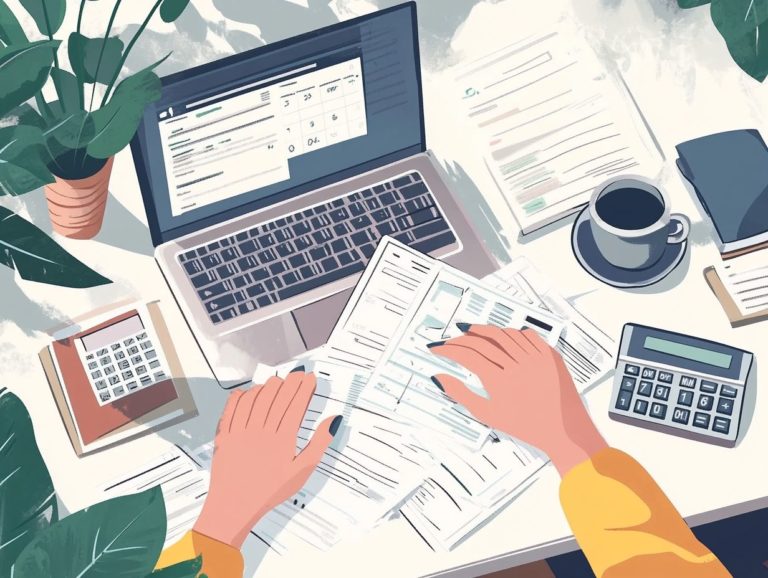How Can I Make My Budget Flexible?
Are you ready to take control of your finances and embrace a more flexible budget? In today s fast-paced world, a rigid budget often feels more like a constraint than a helpful guide.
A flexible budget empowers you to navigate life s unexpected twists and turns, ensuring your financial stability. This article delves into the many benefits of adopting a flexible budget, helping you assess your current spending habits and pinpoint areas where you can introduce some much-needed adaptability.
You ll find practical strategies for trimming expenses and boosting your income, along with tips for managing those surprise costs that life throws your way. Embrace the art of adaptability and discover how to craft a budget that genuinely works for your unique lifestyle.
Contents
Key Takeaways:

- A flexible budget allows for adaptability to unexpected expenses and changing circumstances.
- Assessing your current budget and identifying areas for flexibility is crucial for creating a more adaptable financial plan.
- Strategies such as cutting expenses and increasing income can help make your budget more flexible and resilient.
The Importance of a Flexible Budget
A flexible budget is essential for you and your family as you navigate your finances. It grants you the ability to adjust your budget over time to shifting financial priorities and unexpected expenses with ease.
By recognizing the significance of tracking your expenses and utilizing a budgeting tool like the EveryDollar app a budgeting tool that helps you manage your money you can effectively allocate your savings while still covering both necessary and non-essential spending.
This adaptability not only aids you in reaching your financial goals but also cultivates a sense of security and control over your financial future.
Understanding the Benefits
Understanding the benefits of a flexible budget is crucial for anyone looking to elevate their financial health and manage expenses with precision.
By embracing this adaptable financial tool, you can significantly bolster your financial stability. This enables you to make accurate adjustments in response to life s unexpected twists, like medical emergencies or sudden car repairs.
A flexible budget gives you the power to navigate these unforeseen challenges and encourages wise financial decision-making.
This approach aligns your spending with personal financial priorities, ensuring that essentials are covered while still allowing for savings and investments. Ultimately, this adaptability lays the groundwork for a more secure financial future, where peace of mind flourishes even amid uncertainty.
Assessing Your Current Budget
Assessing your current budget is crucial for grasping your financial situation and pinpointing areas where adjustments can enhance your spending habits to help you achieve your financial goals.
By leveraging a budgeting tool such as the EveryDollar app, you can efficiently track your expenses and analyze your financial landscape. This approach ensures that you prioritize essential expenditures while still creating space for savings and non-essential spending.
Identifying Areas for Flexibility

Identifying areas for flexibility within your budget is crucial for adapting to fluctuations in income and expenses. To ensure you can maintain your financial priorities, consider exploring strategies on how to stick to your budget long-term.
By examining non-essential spending like dining out, entertainment, and subscriptions you can uncover opportunities to trim costs without significantly impacting your lifestyle. It s also essential to account for unexpected expenses, whether it s an unforeseen car repair or a medical emergency.
Setting aside a small emergency fund can act as a safety net, enabling you to make quick adjustments to your broader financial plan. Prioritizing needs over wants is a wise strategy, ensuring that your financial obligations are met and enhancing your overall financial stability.
This approach equips you to navigate life s unpredictable financial landscape with greater ease.
Start your journey towards a flexible budget today!
Strategies for Making Your Budget Flexible
Implementing strategies to make your budget flexible is essential for successfully navigating the fluctuations of personal finances. For guidance on this, you might consider how budgeting can optimize your spending, particularly if you have an irregular income or work in commission-based roles.
By adopting techniques like trimming unnecessary expenses and seeking opportunities to boost your income, you can cultivate a budget that adapts seamlessly to your financial landscape. If you find yourself exceeding your plan, knowing what to do if you go over budget is essential. This approach allows you to prioritize savings, cover essential expenses, and achieve your financial goals without the stress of rigid constraints.
Cutting Expenses
Cutting expenses is an essential strategy for anyone seeking to craft a more flexible budgeting plan while working towards their financial aspirations.
By carefully examining discretionary expenses, you can uncover areas where you might be overspending without even realizing it. For example, take a moment to evaluate your recurring subscriptions whether they re streaming services, magazines, or gym memberships and reflect on which ones genuinely enhance your lifestyle.
Tracking your daily expenditures can illuminate habitual spending patterns, like those frequent coffee shop visits or impulsive buys at convenience stores. By setting a monthly budget and establishing financial boundaries, you give yourself the power to make intentional choices.
Employing simple yet effective strategies, such as meal planning to cut down on dining out, can lead to substantial savings over the course of the month.
Increasing Income
Increasing your income is a vital strategy for enhancing your flexible budget, especially if you rely on commission-based jobs or have an irregular income.
By exploring various avenues to supplement your earnings, you can significantly bolster your financial stability. Side gigs whether freelancing, tutoring, or diving into the gig economy (short-term jobs or freelance work instead of permanent positions) offer excellent opportunities to earn extra cash outside of traditional roles. Engaging in discussions about raises or promotions can also elevate your overall income.
Investing in skills development through courses or workshops equips you with the knowledge to pursue higher-paying opportunities. These proactive steps pave the way toward achieving your financial goals and maintaining a well-balanced budget, ultimately crafting a more secure future.
Creating a Plan for Unexpected Expenses

Creating an effective plan can protect your finances from unexpected expenses, crucial if your income sources are irregular. By setting up an emergency fund and implementing an effective backup plan, you position yourself to handle surprises easily, ensuring that your financial goals and monthly budget remain intact.
Emergency Fund and Backup Plan
An emergency fund is essential for your backup plan, giving you the power to manage unexpected expenses without disrupting your carefully crafted budget.
This financial cushion brings you peace of mind during tough times. It also shields you from the necessity of resorting to high-interest debt when surprises strike whether that s a sudden car repair or an unforeseen medical bill. Experts recommend setting aside three to six months’ worth of living expenses to effectively navigate these situations and uphold your financial stability.
This fund also helps you seize unexpected opportunities, like a job change or timely home repairs, without throwing your long-term plans off course. In the end, a well-established emergency fund significantly enhances your overall financial health, providing the flexibility you need to tackle life’s unpredictable challenges with confidence.
Staying Flexible with Your Budget
Staying flexible with your budget is an ongoing journey that demands regular revision and adaptation to navigate the shifting tides of your financial circumstances, particularly if you have irregular income.
By consistently reassessing your financial priorities and diligently tracking your expenses, you can ensure that your budget remains in harmony with your financial goals, all while allowing for essential adjustments along the way.
Don’t wait set up your emergency fund today!
Tips for Adapting to Changing Circumstances
Adapting to changing circumstances demands that you take charge of budgeting. This ensures your financial goals remain within reach despite life’s uncertainties.
Assess your current financial situation regularly, especially when faced with unpredictable income fluctuations or unexpected expenses. Here are some effective strategies to help you adapt:
- Creating an emergency fund
- Adjusting your spending habits to prioritize essential expenditures
Regularly review your financial goals to adjust your budget. By focusing on your essential needs while also reserving a bit of space for savings, you’ll build resilience and thrive!
Frequently Asked Questions

How Can I Make My Budget Flexible?
Making your budget flexible means being able to adjust it according to your changing financial needs and goals. To learn more about this process, you can explore how to adjust your budget over time. This approach allows you to have better control over your finances and make the most out of your money.
Why is it Important to Have a Flexible Budget?
A flexible budget helps you adapt to unexpected expenses, changes in income, or new financial goals. For more insights on this topic, check out how to handle unexpected expenses in your budget. It can help you avoid overspending and stay on track with your long-term financial plans.
What Are Some Tips for Making My Budget More Flexible?
Start by identifying your fixed expenses, such as rent or mortgage, and then prioritize your variable expenses, such as groceries and entertainment. Be realistic about your income and expenses, and regularly review and adjust your budget as needed.
How Can I Prepare for Unexpected Expenses with a Flexible Budget?
Set aside an emergency fund and include it in your budget as a variable expense. This will provide a cushion to cover unexpected costs without disrupting your overall budget.
Can I Still Save Money with a Flexible Budget?
Absolutely! In fact, a flexible budget can help you save money by allowing you to allocate more funds toward your savings when you have extra income or by reducing your spending in certain areas when needed. To learn more about making budgeting enjoyable, check out how to make your budget fun and engaging.
What Are the Benefits of Having a Flexible Budget?
Besides handling unexpected expenses, a flexible budget can help you reach your financial goals faster and with less stress. It can also improve your overall financial management skills and give you a better understanding of your spending habits.
Take charge of your finances today with a flexible budget!






